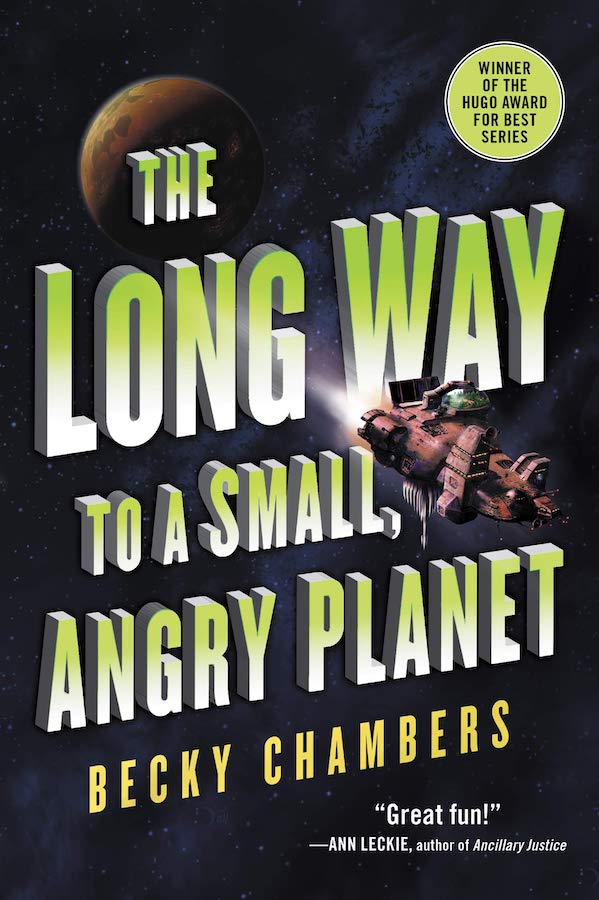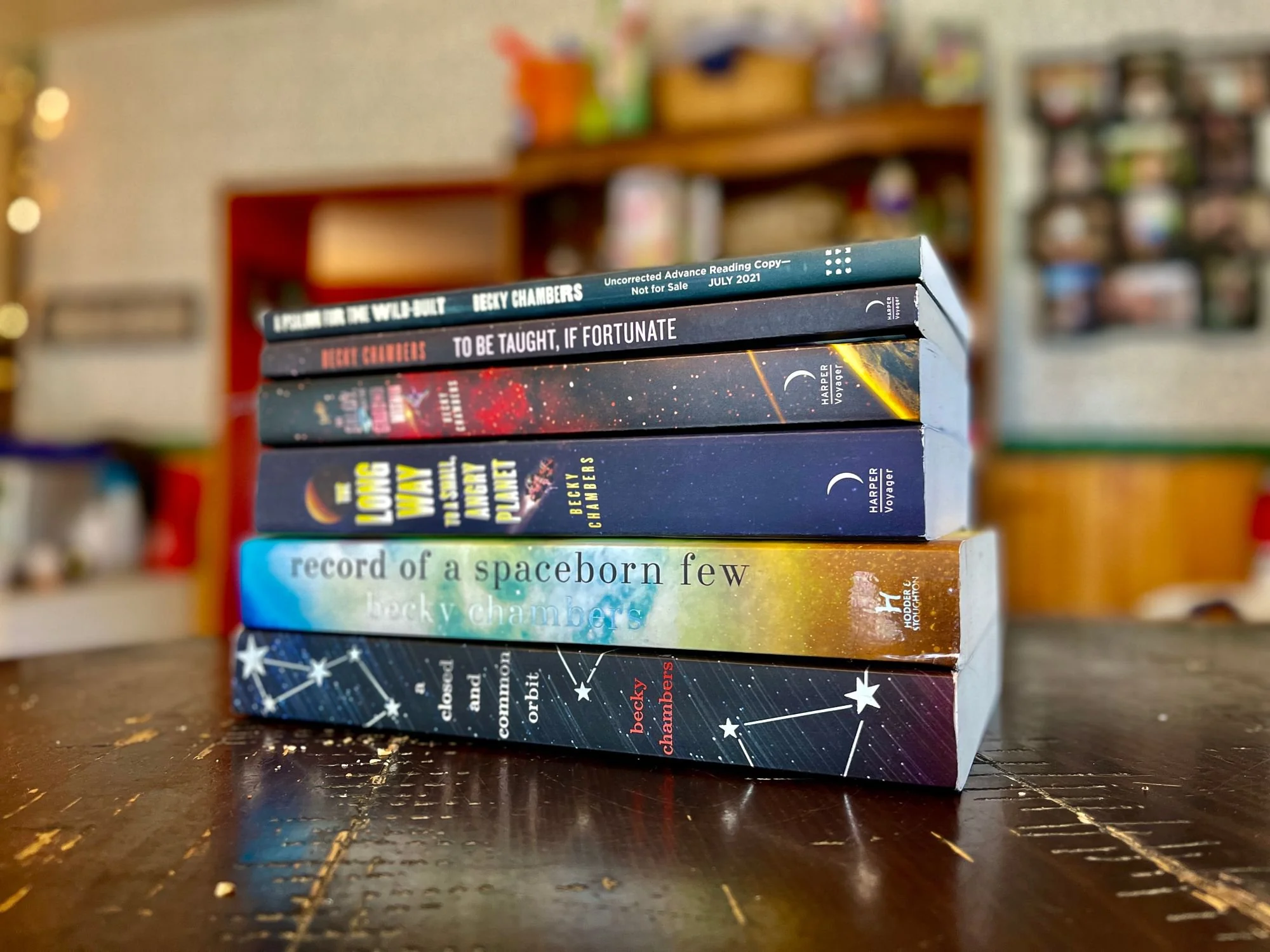Becky Chambers has emerged as a prominent voice in contemporary science fiction, renowned for her inclusive and optimistic narratives. Her works, rich with empathy and exploration, carve a unique space in a genre often dominated by dystopian themes. This article delves into the style, inspiration, and recurring themes in Chambers’ novels, alongside an outline of each book she has authored.
Style
Chambers’ writing style is characterized by its warmth and accessibility. Unlike the often complex and jargon-heavy prose found in traditional science fiction, her language is inviting and straightforward. This makes her stories appealing not only to seasoned sci-fi readers but also to those new to the genre. Chambers excels in character-driven narratives, where the focus is less on grandiose technological marvels and more on the interpersonal relationships and growth of her characters.
Her dialogue is natural and fluid, capturing the essence of each character’s voice. Chambers has a talent for weaving intricate world-building details into her stories without overwhelming the reader, seamlessly integrating the unique aspects of her universes into the narrative.
Inspiration
Chambers draws inspiration from various sources, including her own life experiences, societal observations, and other literary works. Growing up in a family of scientists, she was exposed to discussions about space and technology from an early age, fostering her fascination with the cosmos. This background is evident in her meticulous world-building and the scientific plausibility of her settings.
Moreover, Chambers’ time living in diverse places around the world, including Iceland and Scotland, has broadened her understanding of different cultures and lifestyles. This cultural awareness permeates her work, leading to the creation of rich, diverse worlds inhabited by equally diverse characters.
Literary influences include the works of Ursula K. Le Guin and James Tiptree Jr., both of whom are known for their thought-provoking and socially conscious science fiction. Like these authors, Chambers explores themes of identity, community, and coexistence, challenging readers to envision better futures.
Themes
Several recurring themes define Chambers’ body of work:
- Community and Connection: Chambers’ novels often emphasize the importance of community and the bonds that tie individuals together. Her characters find strength and solace in their relationships, whether they are family by blood or by choice.
- Diversity and Inclusion: Her stories celebrate diversity in all its forms, from varied species and cultures to different gender identities and sexual orientations. Chambers’ inclusive approach challenges the often homogenous portrayal of characters in science fiction.
- Optimism and Hope: A hallmark of Chambers’ writing is her optimistic outlook on the future. Even when her characters face adversity, there is an underlying sense of hope and the possibility of a better tomorrow.
- Exploration and Discovery: Many of her works revolve around the theme of exploration, both in terms of space travel and personal growth. Her characters embark on journeys that lead to self-discovery and a deeper understanding of the universe around them.
Outlines of Becky Chambers’ Novels

The Long Way to a Small, Angry Planet (2014)
Outline: The first book in the Wayfarers series introduces readers to the crew of the Wayfarer, a spaceship tasked with creating wormholes for interstellar travel. The diverse crew, including humans, aliens, and an AI, must work together on a long-haul mission to a distant planet. Throughout their journey, they navigate personal challenges, forge deep bonds, and confront the moral complexities of their work.
Themes: The novel explores themes of found family, diversity, and the ethical implications of space colonization. It underscores the idea that true progress is achieved through understanding and cooperation.
A Closed and Common Orbit (2016)
Outline: The second Wayfarers novel shifts focus to Lovelace, an AI from the first book, and her quest for identity after being placed in an illegal synthetic body. Alongside her is Pepper, a technician with a mysterious past. The narrative alternates between Lovelace’s adjustment to her new existence and Pepper’s backstory as a genetically modified child worker.
Themes: Identity, self-discovery, and the right to autonomy are central themes. The novel also delves into themes of trauma and recovery, illustrating how individuals can rebuild their lives after harrowing experiences.
Record of a Spaceborn Few (2018)
Outline: This installment explores the lives of the Exodans, descendants of humans who left Earth centuries ago. Living aboard a fleet of aging spaceships, the Exodans must confront the sustainability of their way of life and their place in the broader galactic community. The story is told through multiple perspectives, offering a mosaic of experiences.
Themes: Community, tradition versus progress, and the search for belonging are prominent themes. Chambers examines how societies evolve and the importance of preserving cultural heritage while adapting to new realities.
To Be Taught, If Fortunate (2019)
Outline: A standalone novella, this story follows a crew of astronauts on a mission to explore exoplanets. Using a unique method of somatic modification, the crew adapts their bodies to survive the harsh environments of the planets they visit. As they journey further from Earth, they grapple with isolation and the ethical dilemmas of their mission.
Themes: Exploration, the ethics of scientific discovery, and the human desire for connection are key themes. The novella also raises questions about humanity’s responsibility to the planets and life forms they encounter.
The Galaxy, and the Ground Within (2021)
Outline: The final book in the Wayfarers series takes place on Gora, a planet without a native population but serving as a bustling hub for interstellar travelers. When a catastrophic accident forces a group of strangers to seek refuge together, they must navigate cultural differences and personal conflicts.
Themes: The novel focuses on empathy, understanding, and the power of intercultural communication. It highlights how crisis situations can bring out the best in people and the importance of finding common ground.
A Psalm for the Wild-Built (2021)
Outline: The first book in the Monk & Robot series introduces readers to a world where humans and robots coexist but have chosen to live separately. Sibling Dex, a tea monk seeking purpose, encounters a robot named Mosscap, who is on a quest to understand humanity. Together, they embark on a journey of mutual discovery.
Themes: The book explores themes of purpose, coexistence, and the relationship between technology and nature. It questions what it means to live a fulfilling life and how different beings can learn from each other.
A Prayer for the Crown-Shy (2022)
Outline: Continuing the story from the first Monk & Robot book, this novel follows Dex and Mosscap as they journey through various human settlements. As Mosscap seeks answers about human existence, Dex contemplates their own life choices and aspirations.
Themes: The novel delves deeper into themes of self-reflection, the search for meaning, and the value of companionship. It also touches on the balance between progress and sustainability.
If You Like These Books, You Should Read Becky Chambers
Becky Chambers’ unique blend of heartfelt storytelling, rich world-building, and focus on character-driven narratives makes her a standout in contemporary science fiction. If you enjoy books that offer deep emotional resonance, thoughtful exploration of social issues, and a sense of optimism, then Chambers’ novels are a perfect addition to your reading list. Here are a few books that share thematic or stylistic similarities with her work:
1. “The Left Hand of Darkness” by Ursula K. Le Guin
Le Guin’s classic novel is a cornerstone of socially conscious science fiction, much like Chambers’ work. It explores themes of gender, culture, and political intrigue on the planet Gethen, where the inhabitants can change gender. Both authors excel in creating immersive worlds and examining the complexities of human (and alien) relationships.
2. “Station Eleven” by Emily St. John Mandel
Though not science fiction in the traditional sense, “Station Eleven” offers a poignant look at humanity through the lens of a post-apocalyptic world. Mandel’s focus on character and the interconnectedness of their stories echoes Chambers’ narrative style. Both authors weave hope and resilience into their tales, making readers reflect on the beauty of human connections.
3. “The Long Earth” series by Terry Pratchett and Stephen Baxter
This series explores parallel worlds and the adventures of those who can travel between them. Like Chambers, Pratchett and Baxter delve into the implications of exploration and the diversity of cultures. The collaboration brings a blend of humor, philosophical musings, and richly imagined worlds that fans of Chambers will appreciate.
4. “The Calculating Stars” by Mary Robinette Kowal
Kowal’s novel, the first in the Lady Astronaut series, combines historical fiction with science fiction to tell the story of an alternate 1950s space race. It features a strong, diverse cast of characters and tackles themes of gender equality and social progress, similar to Chambers’ focus on inclusivity and community.
5. “All Systems Red” by Martha Wells
The first book in the Murderbot Diaries, “All Systems Red,” introduces a security android with a penchant for watching soap operas. Wells’ series is character-driven, with a humorous and introspective protagonist who grapples with questions of identity and autonomy. Fans of Chambers’ empathetic AI characters will find much to love in Murderbot’s adventures.
6. “The Expanse” series by James S.A. Corey
For readers who enjoy intricate world-building and complex interstellar politics, “The Expanse” series offers a thrilling ride. While it leans more toward hard science fiction, its exploration of human relationships and ethical dilemmas aligns with Chambers’ storytelling approach. The series balances action with deep character development, appealing to those who appreciate Chambers’ nuanced narratives.
7. “Kindred” by Octavia Butler
Butler’s groundbreaking novel blends science fiction with historical fiction as it follows an African American woman who time-travels to the antebellum South. “Kindred” addresses themes of race, power, and survival, much like Chambers’ exploration of societal issues through a speculative lens. Both authors challenge readers to think critically about the world around them.
8. “The Broken Earth” trilogy by N.K. Jemisin
Jemisin’s award-winning trilogy is a masterclass in world-building and tackling complex social issues. Set in a world ravaged by apocalyptic events, it explores themes of oppression, resilience, and identity. Chambers’ readers will find Jemisin’s characters and themes resonate deeply, offering a similarly rich and thought-provoking experience.
Becky Chambers
Becky Chambers has carved a niche in science fiction with her distinctive style, inspired by her scientific background, diverse experiences, and literary influences. Her novels, rich with themes of community, diversity, optimism, and exploration, offer readers a refreshing and hopeful perspective on the future. Through her intricate world-building and empathetic character portrayals, Chambers invites us to imagine a universe where understanding and cooperation prevail, encouraging us to strive for such a reality in our own world.



